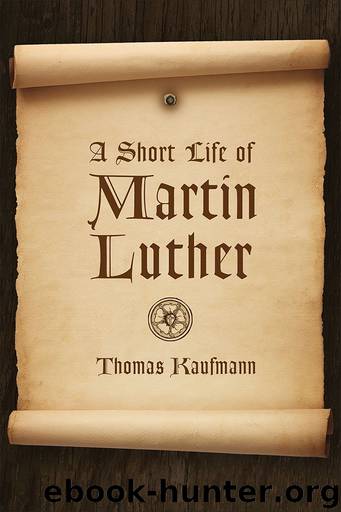A Short Life of Martin by Thomas Kaufmann

Author:Thomas Kaufmann
Language: eng
Format: epub
Publisher: William B. Eerdmans Publishing Company
EPILOGUE
Luther and Christianity
In the history of the Western Church—indeed, of Christianity as a whole—the Lutheran Reformation marks a radical break. This holds for theological understanding, for the practice of faith, and for the institutional form of ecclesiastical fellowship. Luther’s work has not only continued to influence those who implicitly or explicitly follow him in the so-called Lutheran church bodies. The Anabaptists and the spiritualists had to work out their own type of religious communities in connection with or by differentiation from him. Likewise, in the Reformation movement that proceeded from him, the pope’s church for the first time found itself opposed to a massive heresy that it could neither assimilate nor eliminate, and whose questions posed a challenge from which, in the long run, it could not escape. From its controversy with Luther and all its consequences, Rome too at last became a different church. Its fundamental renewal, which was begun and propelled by the Council of Trent (1545–1563), brought forth the Roman Catholic confessional church, which still today represents itself as the legally and organizationally strongest, and most truly global, form of institutional Christianity.
Through Luther and the conditions that enabled the Reformation to stay alive, a church without the pope became a reality in the domain of Western Christianity. Luther sometimes characterized the primary achievement of his life as a fight against the papacy. For example, as an inscription on his grave he considered the prophetic statement that, alive, he would ruin the pope; dead, he would be the pope’s death (Pestis eram vivens, moriens ero mors tua, papa).1 Obviously, that expectation did not come true. Nevertheless, with Luther churchly Christianity became plural, not because he had wanted this, but because in the long run the pope’s church closed itself off to his questions. For the condemnation of this “heretic” has not yet been revoked even today; according to Roman Catholic teaching, Luther is damned for time and eternity. The condemnation applies not only to Luther himself but also to all those who might feel committed, directly or indirectly, to his interpretation of Christianity.
Being condemned as a heretic while attesting that he was bound by conscience to Holy Scripture and, in his judgment, had never been refuted on that score, was Luther’s traumatic primal experience and the birth shock of Protestant Christianity. Ejected from the protective lap of mother church, the church of Luther could not be a mother; “the church is a daughter, born from the Word, not a mother of the Word” (Ecclesia enim est filia, nata ex verbo, non est mater verbi).2 The freedom of the church Luther derived from its freedom for the gospel and for faith. His rejection of individualistic and sectarian forms of Christian community was based on the pathos of freedom that he saw God opening up in accepting sinners—who cannot look away from the self, and cannot love God and neighbor for their own sake—for the sake of Christ, by grace alone. Such a freedom, bestowed as a gift of God
Download
This site does not store any files on its server. We only index and link to content provided by other sites. Please contact the content providers to delete copyright contents if any and email us, we'll remove relevant links or contents immediately.
| Military | Political |
| Presidents & Heads of State | Religious |
| Rich & Famous | Royalty |
| Social Activists |
Waking Up in Heaven: A True Story of Brokenness, Heaven, and Life Again by McVea Crystal & Tresniowski Alex(37812)
Empire of the Sikhs by Patwant Singh(23086)
We're Going to Need More Wine by Gabrielle Union(19046)
Hans Sturm: A Soldier's Odyssey on the Eastern Front by Gordon Williamson(18592)
Leonardo da Vinci by Walter Isaacson(13337)
The Radium Girls by Kate Moore(12028)
Tools of Titans by Timothy Ferriss(8396)
Educated by Tara Westover(8054)
How to Be a Bawse: A Guide to Conquering Life by Lilly Singh(7486)
Permanent Record by Edward Snowden(5847)
The Last Black Unicorn by Tiffany Haddish(5636)
The Rise and Fall of Senator Joe McCarthy by James Cross Giblin(5281)
Promise Me, Dad by Joe Biden(5154)
The Wind in My Hair by Masih Alinejad(5095)
A Higher Loyalty: Truth, Lies, and Leadership by James Comey(4964)
The Crown by Robert Lacey(4817)
The Iron Duke by The Iron Duke(4356)
Joan of Arc by Mary Gordon(4113)
Stalin by Stephen Kotkin(3968)
